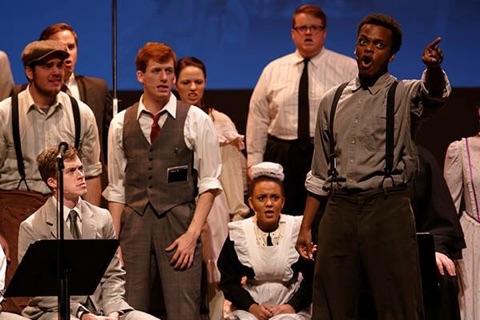When one’s mind is brought to the word “parade,” the things that come to mind revolve around the idea of elaborate and colorful floats, pageant winners and politicians waving from the backs of convertibles, and maybe a giant balloon shaped like an animated character or two. However, what is probably the furthest from mind is the recollection of a century-old tragedy that still resonates through the heart of our city.
At the end of fall semester, KSU’s theater department put on a musical called Parade, but the somber and gutting subject matter was far from the frivolous delight of any processional display. The show is based on the true and tragic story of Leo Frank, played by Elliott Folds, who was a resident of Atlanta in the early 20th Century. Frank is wrongfully accused of murdering a fellow employee at the pencil factory, 13-year-old Mary Phagan. What follows is a brutal court case filled with unreliable witnesses, but even after he is declared guilty, his brave, young wife Lucille Frank, played by Avery Rabbitt, refuses to give up until her husband’s name is cleared. However, when he is finally proven innocent in 1915, he is taken away in the night and lynched by those who loved Mary Phagan.

The show itself was breathtaking. This particular version of the musical was designed to mainly showcase the music of the show, and cast members were met with the unusual challenge of being on stage, in the choir or otherwise, for the duration of the show. However, the entire cast exceeded expectations and audiences were fully enthralled, feeling conflicting emotions as the beauty of the songs and the tragedy of the events merged from beginning to end.
Beyond the initial performance, this show featured a few unique aspects that only added to the overall experience. While the setting of the story is Marietta and Atlanta, this was the first time “Parade” has ever been performed in the area, and the locations for the two performances were chosen for very specific reasons. According to cast member and KSU theater major James Strawder, Marietta Square’s Strand Theatre was chosen for opening night because the square was the location of Leo Frank’s murder, and The Atlanta-Temple, the location of the second, more intimate showing, was where Leo and Lucille Frank were married in 1910. It is also worth noting that the show’s Marietta debut took place 100 years after the 1915 lynching of Leo Frank.

Another exciting event that surrounding this production was the presence of the playwright of “Parade,” Alfred Uhry. The writer, famous for his Pulitzer-winning Driving Miss Daisy, visited with the cast before the opening performance and even stayed after to participate in a “talkback” with the cast and audience members.
The show and all the details surrounding it not only made for an entertaining evening, but also reminded all in attendance of the importance and relevancy of theater. For many Atlanta and Marietta natives, this was their first time hearing of the tragic deaths of both Leo Frank and Mary Phagan; however, they were and continue to be important parts of our heritage and our future.
In a BroadwayWorld article about KSU’s production of “Parade,” Director Harrison Long states, “This show helps us better understand where we are today because it reminds us where we came from.”
Without our knowledge of the past, we lack the means to formulate our own identities in the present. Truly “Parade” was an important production that will not be quickly forgotten.

